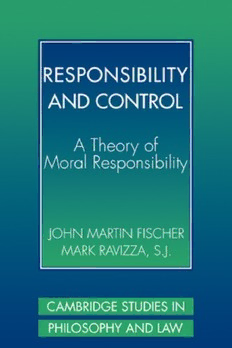Table Of ContentThis book provides a comprehensive, systematic theory of moral
responsibility. The authors explore the conditions under which in-
dividuals are morally responsible for actions, omissions, conse-
quences, and emotions. The leading idea in the book is that moral
responsibility is based on "guidance control/7 This control has two
components: the mechanism that issues in the relevant behavior
must be the agent's own mechanism, and it must be appropriately
responsive to reasons. The book develops an account of both compo-
nents. The authors go on to offer a sustained defense of the thesis that
moral responsibility is compatible with causal determinism.
This major study will interest moral philosophers, legal theorists,
and those in religious studies concerned with the issue of moral
responsibility.
Responsibility and Control
Cambridge Studies in Philosophy and Law
GENERAL EDITOR: Gerald Postema
(University of North Carolina, Chapel Hill)
ADVISORY BOARD
Jules Coleman (Yale Law School)
Anthony Duff (University of Stirling)
David Lyons (Boston University)
Neil MacCormick (University of Edinburgh)
Stephen Munzer (U.C.L.A. Law School)
Phillip Pettit (Australian National University)
Joseph Raz (University of Oxford)
Jeremy Waldron (Columbia University)
Other books in the series
Jeffrie G. Murphy and Jean Hampton: Forgiveness and mercy
Stephen R. Munzer: A theory of property
R. G. Frey and Christopher W. Morris (eds.): Liability and re-
sponsibility: Essays in law and morals
Robert F. Schopp: Automatism, insanity, and the psychology of
criminal responsibility
Steven J. Burton: Judging in good faith
Jules Coleman: Risks and wrongs
Suzanne Uniacke: Permissible killing: The self-defense justification
of homicide
Jules Coleman and Allen Buchanan (eds.)- In harm's way: Essays
in honor of Joel Feinberg
Warren F. Schwartz (ed.): Justice in immigration
R. A. Duff (ed.): Philosophy and the criminal law
Larry Alexander (ed.): Constitutionalism
R. Schopp: Justification defenses and just convictions
Anthony Sebok: Legal positivism in American jurisprudence
William Edmundson: Three anarchical fallacies: An essay on polit-
ical authority
Arthur Ripstein: Equality, responsibility, and the law
Heidi M. Hurd: Moral combat
Responsibility and Control
A Theory of Moral Responsibility
JOHN MARTIN FISCHER
UNIVERSITY OF CALIFORNIA, RIVERSIDE
MARKRAVIZZA,S.J.
JESUIT SCHOOL OF THEOLOGY, BERKELEY
CAMBRIDGE
UNIVERSITY PRESS
CAMBRIDGE UNIVERSITY PRESS
Cambridge, New York, Melbourne, Madrid, Cape Town, Singapore, Sao Paulo
Cambridge University Press
The Edinburgh Building, Cambridge CB2 8RU, UK
Published in the United States of America by Cambridge University Press, New York
www.cambridge.org
Information on this title: www.cambridge.org/9780521480550
© Cambridge University Press 1998
This publication is in copyright. Subject to statutory exception
and to the provisions of relevant collective licensing agreements,
no reproduction of any part may take place without the written
permission of Cambridge University Press.
First published 1998
First paperback edition 2000
A catalogue record for this publication is available from the British Library
Library of Congress Cataloguing in Publication data
Fischer, John Martin, 1952 -
Responsibility and control : a theory of moral responsibility /
John Martin Fischer, Mark Ravizza.
p. cm. - (Cambridge studies in philosophy and law)
Includes bibliographical references and index.
1. Responsibility. 2. Law - Philosophy. I. Ravizza, Mark, 1958-
II. Title. III. Series.
BJ1451.F57 1997
170-dc21 97-8646
CIP
ISBN 978-0-521-48055-0 hardback
ISBN 978-0-521-77579-3 paperback
Transferred to digital printing 2008
Contents
Acknowledgments page vii
1 Moral Responsibility: The Concept and the Challenges 1
2 Moral Responsibility for Actions: Weak Reasons-
Responsiveness 28
3 Moral Responsibility for Actions: Moderate Reasons-
Responsiveness 62
4 Responsibility for Consequences 92
5 Responsibility for Omissions 123
6 The Direct Argument for Incompatibilism 151
7 Responsibility and History 170
8 Taking Responsibility 207
9 Conclusion 240
Bibliography 261
Index 271
V
Acknowledgments
This book began with a series of conversations about a dozen years
ago at Yale University and builds on our previously published work.
We wish to thank the philosophy departments at Yale and the Uni-
versity of California, Riverside, for providing the contexts for much
of our collaborative work.
Many philosophers have provided very helpful comments on pre-
vious versions of parts of this book, during colloquia and in the
course of other conversations. We are very grateful to them, although
we cannot mention all of their names here. We have especially bene-
fited from comments on the manuscript by Carl Ginet, Randolph
Clarke, Anthony Brueckner, Eleonore Stump, Chris Hill, Tom Senor,
Andrew Eshleman, David Aman, Walter Glannon, Ishtiyaque Haji,
George Thomas, Michael McKenna, Michael Otsuka, Ted Levine,
Victoria Koszowski, and Andy Coats. Paul Hoffman gave us
thoughtful and incisive comments on the entire manuscript. Michael
Bratman was the reader for Cambridge University Press; his thor-
ough, subtle, and insightful comments led to many improvements in
the text.
Various institutions have provided invaluable financial support
for our research. We would especially like to thank Yale University,
the University of California, Riverside, and Santa Clara University.
In the final stages of this project we have also been helped signifi-
cantly by a National Endowment for the Humanities Fellowship for
University Teachers and by a grant from the Franzia Family Jesuit
Fund.
We owe a tremendous debt to our teachers, colleagues, and stu-
dents. They have shaped our thinking deeply. Also, we are extremely
grateful to Jules Coleman, who has provided enthusiastic support for
this project from its inception.
Finally, we would like to acknowledge a substantial intellectual
Acknowledgments
debt to two contemporary philosophers whose work on free will and
moral responsibility is path-breaking. Their work has stimulated and
challenged us. Even when we have disagreed, we have learned a
great deal from them: Harry G. Frankfurt and Peter van Inwagen.

